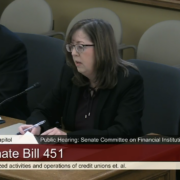Governor Evers Signs Over 50 Bills Into Law
March 21, 2024, was a busy day in Madison with Governor Tony Evers signing over 50 bills into law, including the following list in order of Act numbers. A full list of the bills signed into law yesterday may be found at: https://www.wsaw.com/2024/03/21/gov-evers-takes-action-over-50-senate-assembly-bills/
Note: Regarding SB 616 (now Act 146), the Department of Revenue has posted an updated form instructions and Common Questions to their website.
Senate Bill 759, now 2023 Wisconsin Act 127:
- Makes several changes related to trusts, including administration, adopting the Uniform Powers of Appointment Act, adopting the Uniform Trust Decanting Act, and creating an exception under the general marital property law allowing digital property to be classified as individual property if certain criteria are met.
Senate Bill 773, now 2023 Wisconsin Act 128:
- Repeals the requirement that financial institutions provide advance notice to the Wisconsin Department of Financial Institutions (DFI) before the acquisition, placement, or operation of off-site ATMs.
- Makes it a Class H felony to intentionally cause impairment or interruption to any ATM or customer bank communications terminal.
- Expands the authority of credit unions to purchase, lease, hold, and convey certain real estate, subject to guidance from the Office of Credit Unions.
- Allows credit unions to issue or offer supplemental forms of capital, in the form and with the conditions specified by DFI. All applications for supplemental capital would have to be approved by DFI in writing and obtained before the issuance of the supplemental capital.
- Requires the board of a credit union to fill a vacancy on its board of directors within 90 days of the position becoming vacant, no matter the cause.
- Extends, from 30 days to 60 days, the time during which the Office of Credit Unions must determine whether an activity or power that becomes authorized for federally chartered credit unions should also be authorized for Wisconsin-chartered credit unions.
- Extends the time credit unions have to pay for their required examinations to 30 days after the completion of the examination.
- Removes the restriction on savings and loan associations that require all the loans they provide to be within a 100-mile radius of their office.
- Eliminates disclosure requirements that require lenders to notify a residential mortgage borrower in writing of: (a) the reason(s) for an adverse action on an application (unless a notice as required under federal law is delivered); (b) whether an application fee is refundable; (c) whether the interest rate and other terms of the agreement may change before the closing date; and (d) if the loan servicing for the residential mortgage is sold.
- Repeals certain disclosures required of lenders related to variable rate loans, including disclosure of the index used and its current base and the rights of a borrower concerning a change in the interest rate.
- Extends the maximum maturity date of a promissory note issued by a municipality, county, or school district from 10 years to 20 years.
- Increases, from $400,000 to $1,000,000, the maximum amount of compensation DFI can provide to the state or any local government in this state for losses resulting from the deposit of public money in a failed financial institution.
Senate Bill 626, now 2023 Wisconsin Act 129:
- Allows for a notary public to notarize the creation and execution of a limited financial power of attorney for a real estate transaction for a remotely located individual.
Senate Bill 898, now 2023 Wisconsin Act 130:
- Creates a procedure for estate planning documents to be notarized and/or witnessed remotely.
- Modifies the requirements and procedure for executing certain estate planning documents.
Assembly Bill 574, now 2023 Wisconsin Act 131:
- Creates a regulatory framework for earned wage access service providers, regardless of whether they are physically located in Wisconsin.
- Requires these companies to be licensed by DFI.
- Establishes requirements for providers of earned wage access services to Wisconsin residents to protect consumers.
Senate Bill 628, now 2023 Wisconsin Act 132:
- Defines a “vulnerable adult” as an adult who is at least 65 years of age or who has a physical or mental condition that substantially impairs their ability to care for their needs.
- Defines “financial service providers” to broadly include many financial institutions, including banks, savings and loan associations, credit unions, mortgage brokers, insurance companies, and check cashing services.
- Allows financial service providers to:
- Create a list of persons the vulnerable adult authorizes to be contacted if financial exploitation is suspected.
- Notify certain individuals about the suspected financial exploitation, including the adult’s spouse or adult child; any co-owner, signatory, or beneficiary of the vulnerable adult’s account; and any person on the vulnerable adult’s list of authorized contacts on their account.
Senate Bill 485, now 2023 Wisconsin Act 133:
- Expands the crime of robbery of a financial institution to include creating circumstances that would cause a reasonable person to believe that the use of force was imminent, making it a Class C felony.
Assembly Bill 742, now 2023 Wisconsin Act 138:
- Makes various technical changes to statutes related to the Wisconsin Department of Revenue (DOR) to remove obsolete provisions, eliminate certain ties to dates in the past, and reflect changes in technology.
- Removes the requirement that a property assessment change made by a board of review be made using red ink on the assessment roll and instead requires the clerk to enter the board’s new valuation and a note about the change from the assessor’s valuation into the assessment roll.
- Repeals the requirement that a sales tax exemption certificate issued by DOR be presented to claim the sales tax exemption for insulin, patient health care records, and farm-raised fish.
- Incorporates several technical changes to the Wisconsin Uniform Unclaimed Property Act.
- Updates certain references to, and incorporates definitions from, the Internal Revenue Code to claim the married persons tax credit.
- Repeals a lottery prize provision that applied to prizes awarded on or before Oct. 21, 1998, and would modify the requirement that lottery drawings must be videotaped and audiotaped to allow for digital video recordings to satisfy this requirement.
- Repeals a provision that requires a local board of review to compel the attendance of witnesses at the request of the person objecting to their property tax assessment. This provision was ruled unconstitutional in Metropolitan Associates v. City of Milwaukee in 2011.
- Removes obsolete tax deductions, credits, and exemptions for certain internet equipment purchased before July 1, 2009.
- Repeals obsolete references to tax incremental financing districts that are closed. These provisions would take effect on January 1 after publication of the act.
Senate Bill 616, now 2023 Wisconsin Act 146:
- Creates a sales tax exemption for the sale, storage, and use of portable machinery and equipment used for roads and commercial lot construction and resurfacing.
- Extends the capital gains exclusion to family members who inherit certain farms organized as a partnership or limited liability company.
- Allows the state lottery to engage in 50/50 games by clarifying the lottery would be exempt from posting estimated prize payouts and odds when the price or odds of winning are dependent on the number of participants.
- Shortens the time period in which a person can claim a winning ticket for the lottery share of a secondary or subsequent chance lottery drawing when the prizes are one-time events, such as trips or concerts. Wisconsin residents are currently excluded from these games.
- Increases the withholding threshold for employers of nonresidents from $1,500 to $2,000 to match the income tax filing threshold for nonresidents.
- Allows the department to extend the due date for Wisconsin qualified opportunity fund to file a Form WQOF.
- Extends the maximum number of years someone can serve as an appointed board member of a local exposition district from six years to nine years.
- Makes technical modifications to certain provisions related to 2023 Wisconsin Act 73.
- Makes technical clarification to the income and franchise tax exemption created in 2023 Wisconsin Act 19.
- Provides DOR position authority.
Assembly Bill 793, now 2023 Wisconsin Act 148:
- Makes modifications to the individual income tax treatment for contributions to and withdrawals from section 529 college savings accounts (529 accounts) and the employee college savings account contribution credit.
- Increases the maximum amount that can be deducted from contributions to a 529 account to $5,000 for most filers and $2,500 for married-separate filers.
- Requires the use of a first-in, first-out accounting method for determining which withdrawals would be added to adjusted gross income and would restrict the use of carryover contributions in excess of the maximum deduction threshold if the carryover amount was withdrawn within 365 days of being first contributed.
- Links the definition of “qualified higher education expense” to federal law, which has been expanded to include expenses for apprenticeship programs and qualified education loan repayments.
- Modifies the tax credit that employers may claim for contributions to employees’ 529 plans by increasing the maximum amount to the greater of 50 percent of the contribution or $800, adjusted annually for inflation.









